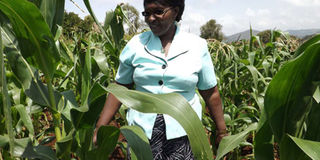Brief news in farming and agribusiness

A farmer inspects her maize crop in a farm in Meru. A new report released calls on the government to put more emphasis on food security. FILE PHOTO | NMG
What you need to know:
- The report commissioned by Route to Food this week provides an analysis of the Kenya National Budget: 2017/2018 and 2018/2019, in respect to agriculture and food security.
- Alexander Owino, a financial consultant, who authored the report pointed out that the country has continually allocated a measly 3 per cent of its annual budget to agriculture, a small amount compared to the 15 per cent needed.
- The group farms maize for use as fodder and human food, an activity that began in 2015 following a clash between the Garre and the Degodia in Mandera North.
- Group members have been able to pay fees for their children in schools and colleges after selling their produce.
Report calls for radical change of agriculture policies
A new report has called for change of approach to food security if the country is to end systemic hunger.
The report commissioned by Route to Food this week provides an analysis of the Kenya National Budget: 2017/2018 and 2018/2019, in respect to agriculture and food security.
It advocates for ‘feed-thyself first’ policies, supported by investment in sectors pertinent to food and nutrition security, especially agriculture.
Mary Mwale, a food security and nutrition specialist, explained that the feed-thyself-first policy entails promotion of family farming practices and creating awareness that food security starts at the household level and promotion of agroecology which shuns use of harmful pesticides and fertilisers.
Alexander Owino, a financial consultant, who authored the report pointed out that the country has continually allocated a measly 3 per cent of its annual budget to agriculture, a small amount compared to the 15 per cent needed.
“The current feed-the-market policies do not effectively respond to the problem of chronic food and nutrition insecurity. Instead of sustainable development, the only thing that is sustained then, is the number of people that depend on charity,” the initiative’s project lead, Layla Liebetrau said.
-Brian Okinda
****
Maize unites warring clans
The group of about 50 men and women of various age groups are busy on the 67-acre farm in Yabicha location, Mandera North Sub County. Some are clearing bushes while others sowing seeds.
Salat Mohamed, the leader of the group known as Julisha Rural Development Association, says the women assist in sowing the seeds and most importantly cook for the entire group.
The group farms maize for use as fodder and human food, an activity that began in 2015 following a clash between the Garre and the Degodia in Mandera North.
“The county government thought of how to bring together members of both clans to build peace and unity and that is when this idea was borne,” says Mohamed, adding the farm was donated to the group by Bashir Sheikh Ali, a clan elder. After financially assisting the group to clear the bushes, Governor Ali Roba administration provided the seeds in the first season.
“We are 50 on this farm representing majorly the two warring clans in Mandera with a simple message of unity,” says Mohamed.
The group has managed to integrate and use the project to reach out to clan members to preach peace. The group sources its irrigation water from the nearby River Dawa.
“Water flows freely in this river and since it is near our farm, we source it by pumping into canals to irrigate maize,” said Mr Salat.
Fodder production according to Dakane Ahmed has created job opportunity to many local youths in Mandera North.
“Apart from just having the group members on the farm, we hire youths to do some jobs and pay them,” he said.
Group members have been able to pay fees for their children in schools and colleges after selling their produce.
They have a vision of forming a cooperative society and increase the membership from the clans in the county.
-Manase Ostialo





